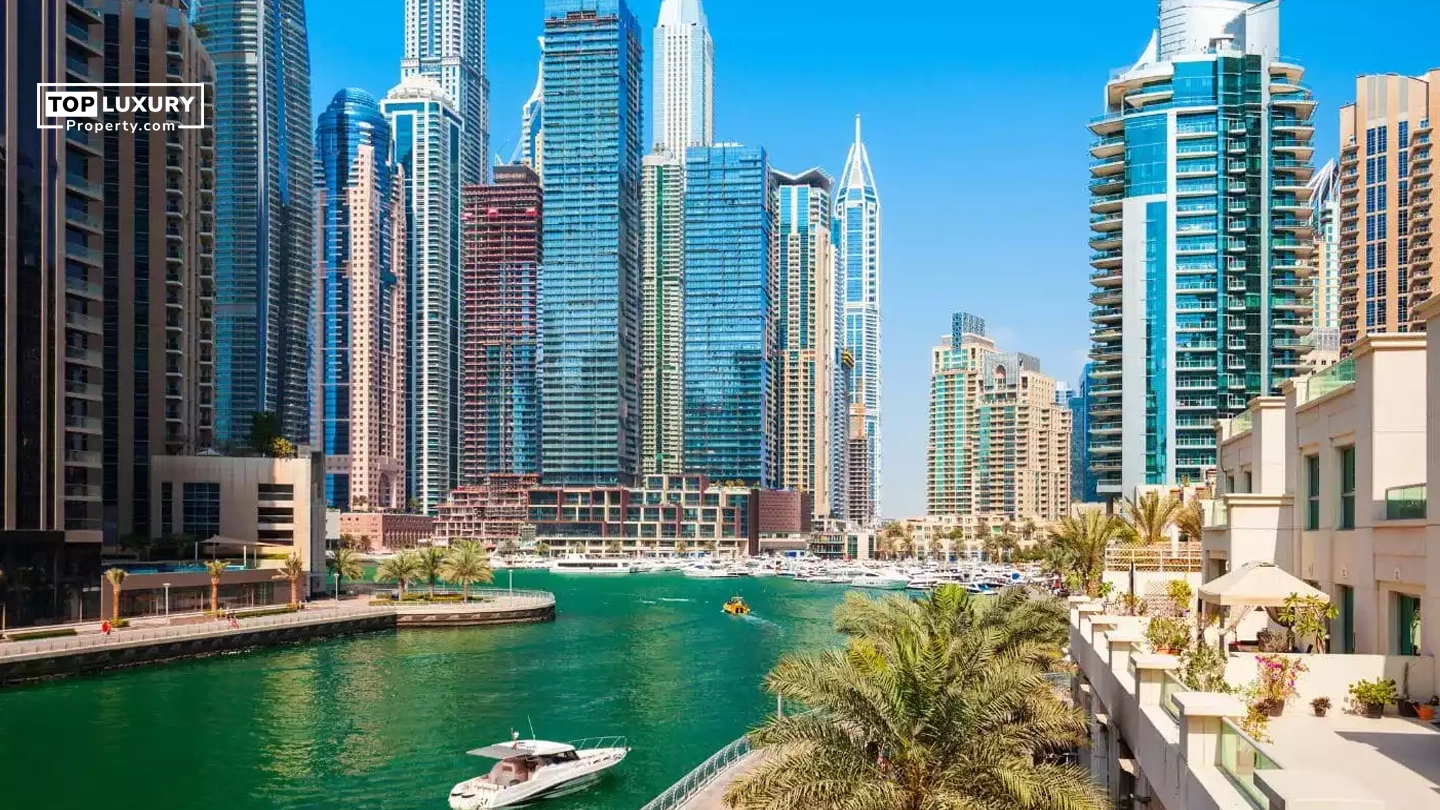This blog is all about Dubai real estate laws and regulations. The UAE Government has issued different rules & regulations and policies for property buying and has also given certain rights to both locals and expats.
So, if you are an expert and not aware of those rules and regulations then stay tuned with the blog till the end. Because it is going to be more informative and will clear most of your doubts.
Dubai is recognised as a luxury city of UAE, quite popular for its skyscraper buildings, modern infrastructure, advanced technology, and unparalleled luxury lifestyle.
According to Numbeo’s 2023 safety index, Dubai is the 5th safest city in the world and holds certain advantages that’s why investors across the globe frequently relocate to Dubai and permanently establish here. Additionally, the UAE government is supporting Dubai Real Estate by issuing different rules and regulations for the enhancement of this sector.
Dubai Real Estate Market is in the growth phase and the above-mentioned reasons are the major key factors of Dubai’s growth. Investors from across the globe show keen interest in property buying in this city which is why the government of the Emirate has declared many laws to make property deals safer. Many strict rules have been taken and regulated, to protect the buyers’ as well as sellers’ rights.
Hence, investors must be aware of Dubai’s real estate laws and regulations to make their investments risk-free. UAE real estate laws say that any expats who wish to live here need a residential permit. Likewise, if you want to purchase any residential as well as commercial properties and want ownership of the property then you have to follow certain rules only then the property will belong to you.
Types of Ownership, Freehold vs Leasehold & Eligibility Criteria:
Unlike other countries, there is no legal document verification process associated with the purchase of any asset in Dubai.
But buyers need to sign a contract to confirm the deal. If you have already set your mind to acquiring a property in Dubai then you must know that the city provides 2 types of ownership for both locals and expats such as freehold & leasehold ownership. These ownership categories have different characteristics and benefits. Let’s understand it in detail.
Freehold Ownership
Such property ownership types are quite popular in Dubai. It gives actual ownership of the unit and the plot the property is built on and allows homeowners to construct, modify and transfer or sell to anyone they wish.
There is no time restriction associated with freehold properties. According to property ownership laws in Dubai, DLD will register the freehold buyer’s name as the landowners in the registry and then grant them a title deed for the property.
The advantage of such property ownership is when the owner passes away the property directly belongs to their heir, hence the property will stay in the family.
Beyond this, if you are foreign nationals, and want to purchase property in Dubai then you can buy property in freehold designated areas only. On top of it, freehold owners have more control over their property and that allows them to even change the structure of the property, renovate and make any changes they need.
Leasehold Ownership
Leasehold Ownership means the owner of leasehold property will not get the full ownership or has no full right over the asset.
The owner can occupy the leasehold property for limited years from 25 to 99 years. In a leasehold property, owners are not allowed to construct, modify or sell the property to anyone. Leasehold ownership has less control over the property as compared to freehold ownership and this is the biggest difference.
Mostly, foreigners struggle with the question of whether they can buy property in Dubai or not. So, yes foreigners also can purchase property in Dubai as the city has designated certain areas which possess freehold status only where foreigners can buy property. This area allows foreign nationals to buy, sell or lease their property.
Eligibility Criteria for Foreigners to Buy Property In Dubai
The Dubai property market is open to foreign nationals and it welcomes foreign investment, hence, if you are a non-resident of UAE and want property investment in Dubai then you must know about some necessary eligibility criteria the UAE Government generally requires.
Valid Passport – Valid Passport is essential for foreign nationals to make a property purchase in Dubai. Foreign buyers must submit a copy of their passport, valid for at least six months is mandatory to confirm their identity.
Offer to Purchase – After selecting the property for sale in Dubai, you must make an offer to purchase. If the seller accepts the offer, a Memorandum of Understanding (MoU) will be drafted.
Sales Agreement- After the MoU, you have to sign a sales agreement document where every detail and terms and conditions have been already mentioned regarding the property sale. So before signing a sales agreement, you need to hire a professional expert to guide you through the process, assist you to verify the document and educate you in detail about the buyer rights.
Bank statement – For non-UAE residents, they need to submit a copy of their bank statements and proof of work status.
What are the restrictions for foreign investors buying property in Dubai?
Foreigners who are looking for investment must seek approval from Dubai Land Department approval. Hence, before making any move foreign investors should be aware of such rules and understand these limitations for the smooth investment process.
Non-residents of UAE or foreigners can buy property only in the freehold zone. The area is specifically designated by DLD (Dubai Land Department) for foreigners to buy property there only. There are certain benefits of such areas, it protects the buyer’s rights such as
- Foreigners will get a freehold ownership
- They can rent, sell, and whatever they do they can have full control over their property
- They can renovate, reconstruct, modify and so on
Designated areas by DLD where foreign nationals can buy properties: –
- The Palm Jumeirah
- Downtown Dubai
- Burj Khalifa
- Dubai Marina
- Emirates Hills
- Barsha Heights
- Blue Water Island
- Business Bay
- Al Barari
- Al Furjan
- Jumeirah Beach Residence
- Jumeirah Lake Towers
- DAMAC Hills
- Dubai Sports City
- Meydan City
- Dubai Silicon Oasis
- Dubai Festival City
- Discovery Gardens
- Dubailand
- Dubai International City
- Jebel Ali Village
- Jumeirah Golf Estate
- Mudon
- Arabian Ranches
- Arabian Ranches II
- Arabian Ranches III
- Falcon city
- City Walk
- Dubai South
- Dubai Maritime City
Law No. 7 and its Importance for Expats
If you are an expat, you must be aware of this most important law. Dubai Real Estate Law No. 7 is one of the major real estate laws and was passed in 2006. Its objective was to reduce the restrictions on expats’ property ownership in Dubai.
Previously, expats were not allowed to hold the title of any property or land in Dubai but after the issue of this law, even non-UAE residents are entitled to obtain property ownership on lease or rent.
Law no. 7 is authorised by the UAE government and holds 99 years of time duration for leasing or renting property.
Property Buying Process and the Role of DLD and RERA in Dubai Real Estate:
Buying property in Dubai is indeed achieving the milestone and the act is filled with joy & excitement. After all, that’s the point when one becomes a property owner in such a city where buying a home is the dream of every home buyer. So here are the steps you should follow for buying property in Dubai.
Research and Preparation: You need to research in-depth on Dubai property market, exercise on some reputed developers and their previous developments and choose your requirements according to that and also make yourself familiarize with the legal framework.
Budget Wisely: Educate yourselves with all the costs associated with property purchase including fees, charges and other expenses. Budget wisely because setting a good credit score offers less financial strain.
Engage Professional: Home buying is a daunting task, hence in this case you have to take a professional real estate agent who will guide you further in your home-buying journey.
Qualified real estate agents will help you with the correct information about the property, similarly, a specialized lawyer would help you with any legal formalities like navigating the process and protecting your interests.
Understand the legal Procedure: Understand the legal steps involved while purchasing a property such as offer and negotiations, sales and purchase agreement, property registration and title transfer.
Financing: Check the financing option and home loan eligibility. Understand the mortgage application process and evaluate the costs according to that. You can research more on this, there are many types of loans available like mortgage loans, budgeting for the downpayment and associated fees and taking financing assistance according to that.
Every year Dubai transacts a high volume of property and maintaining its transparency and integrity is a top priority in Dubai’s real estate realm hence the Real Estate Regulatory Agency (RERA) takes the prime role here. RERA here collects and manages the data of tenants and landlords and resolves any disputes occurring.
The prime role of RERA is to monitor real estate advertisements to give buyers protection from misinformation and ensure their accuracy and reliability. Further, RERA provides licenses to real estate brokers and developers to maintain transparency and integrity.
RERA not only affects real estate agencies but also companies that are involved in real estate such as banks, insurance companies and law firms. RERA ensures that all stakeholders play a fair and honest role in the real estate sector.
Similarly, DLD plays a crucial role in registering and regulating real estate transactions in Dubai such as:-
- While property registration DLD issues ownership certificates and maintains an official land registry
- at the time of property transaction registration DLD provides legal protection and established ownership rights
- Set regulations and maintain standards for the real estate sector
- Provide various public services including property valuation
- Issue official and legally binding documents that certify the ownership of a property
Required Documents for property buying in Dubai
In Dubai, buyers or investors need to submit all the listed below documents while buying property. Here are some key documents: –
- Passport copies: Buyers or investors must provide a copy of valid passports as ID proof
- Emirates ID: UAE residents must submit copies of Emirates ID for additional identification
- Power of Attorney (If applicable): A power of attorney document must be prepared and notarized if either party appoints a representative to act on their behalf.
- Sales and Purchase Agreement: Buyers need to submit the sales and purchase agreement document signed between both of the parties, including the purchase price, payment schedule, and any special needs.
- Title Deed: Legal document that proves your property ownership. It can be any essential details such as the property descriptions, ownership information, and encumbrances
- Proof of Payment: Any payment record such as a copy of bank transfer receipts or cheque proof to fulfil the financial obligations
Inheritance Property Law in Dubai
Inheritance property law is quite complex in Dubai. Suppose the owner of a property hold the citizenship of another nation, then the inheritance property law will also follow the law of that nation.
For expats who hold Dual Citizenship
It is even more complicated if the landlord has dual citizenship, but neither of them is of UAE nationality. In that case, recognition will be given to the one who fits the legal standards of UAE or Dubai. Also, it is necessary to hand over the property to the legitimate receivers.
If you do not have a legal will, the court will decide whether the estate will be owed to the state or whether it will be divided among recipients. For this reason, all non-residents or foreign investors in Dubai are required to have a legal will to protect their assets for their dependents.
Taxation and fees:
Next, come to the taxation and fees. If you are considering buying property in Dubai you need to know details about fees associated with property purchase in Dubai.
Property Purchasing Tax in Dubai
Security Deposit – If you are renting a property in Dubai, tenants are required to provide a security deposit to the landlord. Such fees serve as financial protection for the landlord in case of any damage to the property. The amount of security deposit is equivalent to one- or two month’s rent.
Insurance Fees – Insurance fees are required when you buy a property in any particular project or community. Property developers mandate this fee for property insurance. The cost of insurance fees may vary depending on the property’s location.
So, if you are buying any property and you have to deposit insurance fees then you must understand community management facilities and the purpose of the insurance fees associated with the property.
Property Services Charge – Alternatively known as maintenance fees. Property owners are required to pay this fee. These fees are associated with the community facilities or services whatever the property provides.
Property services charges also vary from builder to builder and depend on the type of property, hence property owners should be aware of these charges.
Dubai Electricity and Water Authority Fees – Property owners in Dubai are responsible for paying Dubai Electricity and Water Authority (DEWA) fees. It is the fees the Owner pays for their electricity and water services.
The DEWA charges fees according to the utilities. So, when buyers purchase any property, they should ensure that utility accounts must be transferred in their name and address to avoid unnecessary issues regarding utility services.
Property Transfer and Registration Fees
The real estate market of Dubai has regulated certain charges or fees for property registration. DLD charges 4% property transfer fees of the total price of the property, it is mandatory when you do any real estate transactions. This applies to the owner of the property when the property is transferred from the sellers to the buyers.
If the property is financed through a mortgage then you have to pay mortgage fees 1% of the bank loan amount, plus 5% VAT. The Mortgage registration fees in Dubai is from AED 500-5,000.
These mortgage rates differ for both expats and locals. The minimum mortgage down payment for expats is 20% and 15 % for locals. Suppose the property price is AED 1 million, expats would pay AED 200,000 and Emiratis would pay AED 2,500 -3,500 plus 5% VAT.
Property Transfer Taxes in Dubai
Given below are some major types of property transfer taxes in Dubai:
- Property Transfer Fee – 4%
- Mortgage Registration Fee -1%
- Municipality Fee -5%
- Land Department Fee -4%
- Brokerage Commission – 2%
- Value Added Tax (VAT) – 5%
Closure
Whether you are an Emirati or Expat, Dubai is open to all types of investors and if you are planning to buy a property there then you must be aware of the Dubai Real Estate laws and regulations before taking any crucial steps. Knowing these rules will not only give you an understanding of the rules of Dubai Property market but will help you in the buying process.






